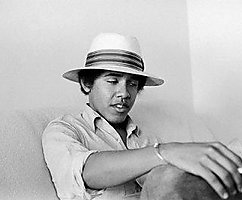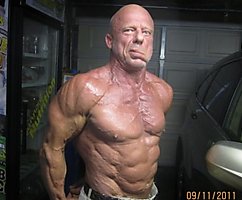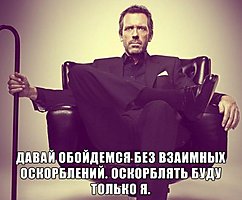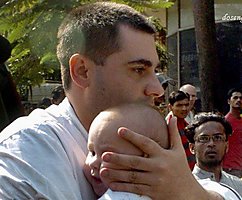Chuck darrah: what is the SECRET of success in Silicon valley
 Bashny.Net
Bashny.Net
Chuck darrah, an anthropologist and resident of Silicon valley, came to a cafe in mountain view in shorts and sandals and without a phone. "I don't want people just might get me," he said, as if it were the most obvious thing in the world. Although now I think it is.
In all other respects the Chuck is Silicon valley so what you can see. He was born in the hospital of Stanford at a time when the city was known as the capital drain. There were orchards, produced dried fruits and nothing more. Young Chuck's life in the Valley was perfect. All of it was a little better than anywhere else. The fruit was delicious, and the air cleaner. Walnuts were the size of a grapefruit. "It was a wonderful place for a child," he says, and I see in his eyes that he left me, going in the old, better times. The garden of Eden before the appearance of the chip.
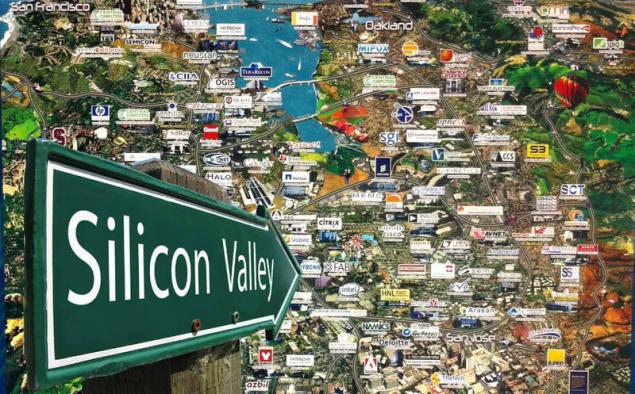
Chuck admits that never thought that would happen. "Someone once came up to me and asked, "Where is this new place called the Silicon?", and I said, "What kind of silicon? Sounds like the stupidest publicity stunt in the world." To this he replied something like: "Yes, we make chips for calculators." To which I replied: "what are you talking About, man?" So, no, I didn't really know what all that goes." Now, despite this, Chuck became Silicon valley someone like Margaret Mead: he crashes through highway 101, exploring the local tribes and their way of life. He finds it extremely exciting.
Who came first and what happened next
We ordered coffee and found a table outside. The secret of success in Silicon valley, he says, not that she was the best — she simply was the first. "The advantage of the pioneer" — as they call it, and it explains a lot, not only innovation Valley. Take the keyboard of your computer. The upper-left of the letters QWERTY. Why? This is the most efficient method of keyboard layout? Unlikely. In fact, most of the irrational.
Before keys typewriters broke down, and the designers decided to arrange them so as to slow down the speed of typing text and reduce the risk of breakage. New typewriters are no longer flashed, but the QWERTY layout stuck. Typists have become accustomed to these limitations and continued to work no matter what. They were trained in special schools. So it remains, despite the fact that this layout could be far better.
Similarly, the video format VHS prevailed over Betamax is clearly more deserving. In addition, the colonists stopped near the Massachusetts Bay, and not in Virginia, as were, simply because they are lost.
The point is that the "best" technology or idea does not always win. Sometimes randomness and unforeseen circumstances prevail.
More importantly, what happened after that. We adapt to the inefficiencies of the keyboard, and our fingers flying. VHS is working properly, not yet replaced by DVD. The settlers survive the harsh winters of New England and thrive. This happens with all the places where genius thrives. They may not be perfect or pretty, but they are in a sense, challenge us and when we respond to him in a bold and creative way, then the Foundation is laid of the Golden age.
But in order to learn, you must first get there. That's what explains the philosophy of the Silicon valley: better bring an imperfect product on the market today, than perfect tomorrow. As noted by one Steve jobs: "When he invented the lightbulb, nobody complained that it is too dark."
Places such as Silicon valley have become magnets, and when they are magnetized, the speed is dialed. Again, creativity is contagious. Some researchers found that we more creative when we are surrounded by creative colleagues, even if we don't interact with them directly. We also get a creative boost, just watching the "schema violation" — as someone who eats pancakes for dinner, for example. Something in the creative action inspires us to enhance their own creativity.
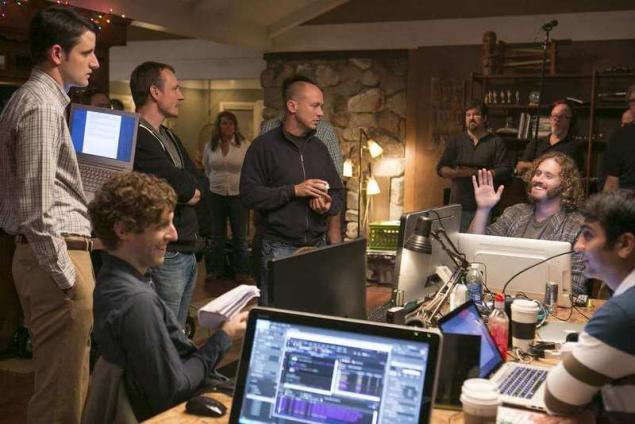
Risk like few
On the way to the Chuck I met van for furniture, parkovatsya around a nondescript office building in mountain view. Workers were busy unloading chairs and tables; sure, they got rid of the traces of previous unsuccessful enterprise to organize in its place a new. The most important symbol of Silicon valley – it's not an iPhone or chip, but these vans.
Mobility, says Chuck, is the key to understanding the Valley. Nothing stands still in Silicon valley, this place has kinetic energy. Look at the top 10 corporations in Silicon valley, offers Chuck. Every five or ten years, this entire list is changed, with the exception of one or two companies. This is not a new concept. I remember Florence: there is a Committee that directed the construction of the Duomo, changed every few months.
One of the biggest myths about Silicon valley, says Chuck, is that the people here are at risk. This myth is partially true, and false. Chuck says that the Valley sings a risk, but at the same time, "she has one of the best mechanisms to prevent the consequences of risk."
"Such as?"
"Just think. We are told that these entrepreneurs have earned their money by taking risks, which went. But you don't see people jumping from rooftops. They always land on their feet. They land in places like this, drinking your cappuccino, because it's a special kind of risk. Most people in the field of high-tech recognized that if you lose your job, then find new ones. They can even find work even better."
"So they have a safety cushion?"
"Yes. Huge. Easier to take the risk when you are protected from it".
It is not great ideas and not technology
I'm sipping my excellent coffee, looking at slipping past the Google machine without drivers, while the male without the phone waves another myth about Silicon valley. The one which says that there is a hotbed of good ideas. This is not so. I admit, it surprised me. I always thought that a great idea – it is a strong side of Silicon valley.
"Nonsense," says Chuck. What makes the Valley special is not themselves ideas, but what happens when these ideas arise. In Silicon valley ideas are not invented, but develop faster and smarter than anywhere else. "If you have an idea, people will tell you how and where it would be more appropriate, explains Chuck. — There are special mechanisms and institutions created to bring together bright people." If Silicon valley were a brain, it would not be a frontal lobe or even a cage, it would be the synapse, that is, the conductor.
Silicon valley is not about technology. Undoubtedly, the products are high-tech, but not the whole point. "People say they come here because it is a technological center, but it's just a way to justify the move, says Chuck. The true reason lies in the fact that transactions are happening differently, and it is here possible to implement them in many different ways".
Also interesting: Jay Abraham: How to harvest big profits in any kind of business
Matt McInnis: 3 bad habits I learned growing up in the Apple — and how I got rid of them
The valley absorbs new immigrants is exactly the same as killing them. "You can talk to people who have been here a few weeks and they will behave as if they are part of the Silicon valley. This place is an amazing way to absorb people, but also let people allow them to go." Magnet, in a word, but also a sieve.published
Source: ideanomics.ru/articles/7943
In all other respects the Chuck is Silicon valley so what you can see. He was born in the hospital of Stanford at a time when the city was known as the capital drain. There were orchards, produced dried fruits and nothing more. Young Chuck's life in the Valley was perfect. All of it was a little better than anywhere else. The fruit was delicious, and the air cleaner. Walnuts were the size of a grapefruit. "It was a wonderful place for a child," he says, and I see in his eyes that he left me, going in the old, better times. The garden of Eden before the appearance of the chip.

Chuck admits that never thought that would happen. "Someone once came up to me and asked, "Where is this new place called the Silicon?", and I said, "What kind of silicon? Sounds like the stupidest publicity stunt in the world." To this he replied something like: "Yes, we make chips for calculators." To which I replied: "what are you talking About, man?" So, no, I didn't really know what all that goes." Now, despite this, Chuck became Silicon valley someone like Margaret Mead: he crashes through highway 101, exploring the local tribes and their way of life. He finds it extremely exciting.
Who came first and what happened next
We ordered coffee and found a table outside. The secret of success in Silicon valley, he says, not that she was the best — she simply was the first. "The advantage of the pioneer" — as they call it, and it explains a lot, not only innovation Valley. Take the keyboard of your computer. The upper-left of the letters QWERTY. Why? This is the most efficient method of keyboard layout? Unlikely. In fact, most of the irrational.
Before keys typewriters broke down, and the designers decided to arrange them so as to slow down the speed of typing text and reduce the risk of breakage. New typewriters are no longer flashed, but the QWERTY layout stuck. Typists have become accustomed to these limitations and continued to work no matter what. They were trained in special schools. So it remains, despite the fact that this layout could be far better.
Similarly, the video format VHS prevailed over Betamax is clearly more deserving. In addition, the colonists stopped near the Massachusetts Bay, and not in Virginia, as were, simply because they are lost.
The point is that the "best" technology or idea does not always win. Sometimes randomness and unforeseen circumstances prevail.
More importantly, what happened after that. We adapt to the inefficiencies of the keyboard, and our fingers flying. VHS is working properly, not yet replaced by DVD. The settlers survive the harsh winters of New England and thrive. This happens with all the places where genius thrives. They may not be perfect or pretty, but they are in a sense, challenge us and when we respond to him in a bold and creative way, then the Foundation is laid of the Golden age.
But in order to learn, you must first get there. That's what explains the philosophy of the Silicon valley: better bring an imperfect product on the market today, than perfect tomorrow. As noted by one Steve jobs: "When he invented the lightbulb, nobody complained that it is too dark."
Places such as Silicon valley have become magnets, and when they are magnetized, the speed is dialed. Again, creativity is contagious. Some researchers found that we more creative when we are surrounded by creative colleagues, even if we don't interact with them directly. We also get a creative boost, just watching the "schema violation" — as someone who eats pancakes for dinner, for example. Something in the creative action inspires us to enhance their own creativity.

Risk like few
On the way to the Chuck I met van for furniture, parkovatsya around a nondescript office building in mountain view. Workers were busy unloading chairs and tables; sure, they got rid of the traces of previous unsuccessful enterprise to organize in its place a new. The most important symbol of Silicon valley – it's not an iPhone or chip, but these vans.
Mobility, says Chuck, is the key to understanding the Valley. Nothing stands still in Silicon valley, this place has kinetic energy. Look at the top 10 corporations in Silicon valley, offers Chuck. Every five or ten years, this entire list is changed, with the exception of one or two companies. This is not a new concept. I remember Florence: there is a Committee that directed the construction of the Duomo, changed every few months.
One of the biggest myths about Silicon valley, says Chuck, is that the people here are at risk. This myth is partially true, and false. Chuck says that the Valley sings a risk, but at the same time, "she has one of the best mechanisms to prevent the consequences of risk."
"Such as?"
"Just think. We are told that these entrepreneurs have earned their money by taking risks, which went. But you don't see people jumping from rooftops. They always land on their feet. They land in places like this, drinking your cappuccino, because it's a special kind of risk. Most people in the field of high-tech recognized that if you lose your job, then find new ones. They can even find work even better."
"So they have a safety cushion?"
"Yes. Huge. Easier to take the risk when you are protected from it".
It is not great ideas and not technology
I'm sipping my excellent coffee, looking at slipping past the Google machine without drivers, while the male without the phone waves another myth about Silicon valley. The one which says that there is a hotbed of good ideas. This is not so. I admit, it surprised me. I always thought that a great idea – it is a strong side of Silicon valley.
"Nonsense," says Chuck. What makes the Valley special is not themselves ideas, but what happens when these ideas arise. In Silicon valley ideas are not invented, but develop faster and smarter than anywhere else. "If you have an idea, people will tell you how and where it would be more appropriate, explains Chuck. — There are special mechanisms and institutions created to bring together bright people." If Silicon valley were a brain, it would not be a frontal lobe or even a cage, it would be the synapse, that is, the conductor.
Silicon valley is not about technology. Undoubtedly, the products are high-tech, but not the whole point. "People say they come here because it is a technological center, but it's just a way to justify the move, says Chuck. The true reason lies in the fact that transactions are happening differently, and it is here possible to implement them in many different ways".
Also interesting: Jay Abraham: How to harvest big profits in any kind of business
Matt McInnis: 3 bad habits I learned growing up in the Apple — and how I got rid of them
The valley absorbs new immigrants is exactly the same as killing them. "You can talk to people who have been here a few weeks and they will behave as if they are part of the Silicon valley. This place is an amazing way to absorb people, but also let people allow them to go." Magnet, in a word, but also a sieve.published
Source: ideanomics.ru/articles/7943
Tags
See also
The success of Steve Jobs
Brian Chesky and Alfred Lin: What is the secret of the company's culture?
Marc Andreessen: why optimism - always a winning strategy
Interview with the assessment of the company's founder $ 2,000,000,000. Stepan Pachikov about his bad experience in high-tech business, "Do not stick your fee will not be in the business"
As "mafia PayPal» affect the success of Silicon Valley
The legendary Robert Widlar. Paranoid and hermit
12 investing rules from Yuri Milner
What is the "Beatles" what is their success?
As Peter Thiel distinguishes insanely steep startup from the mad
10 secrets to success of the richest cat



